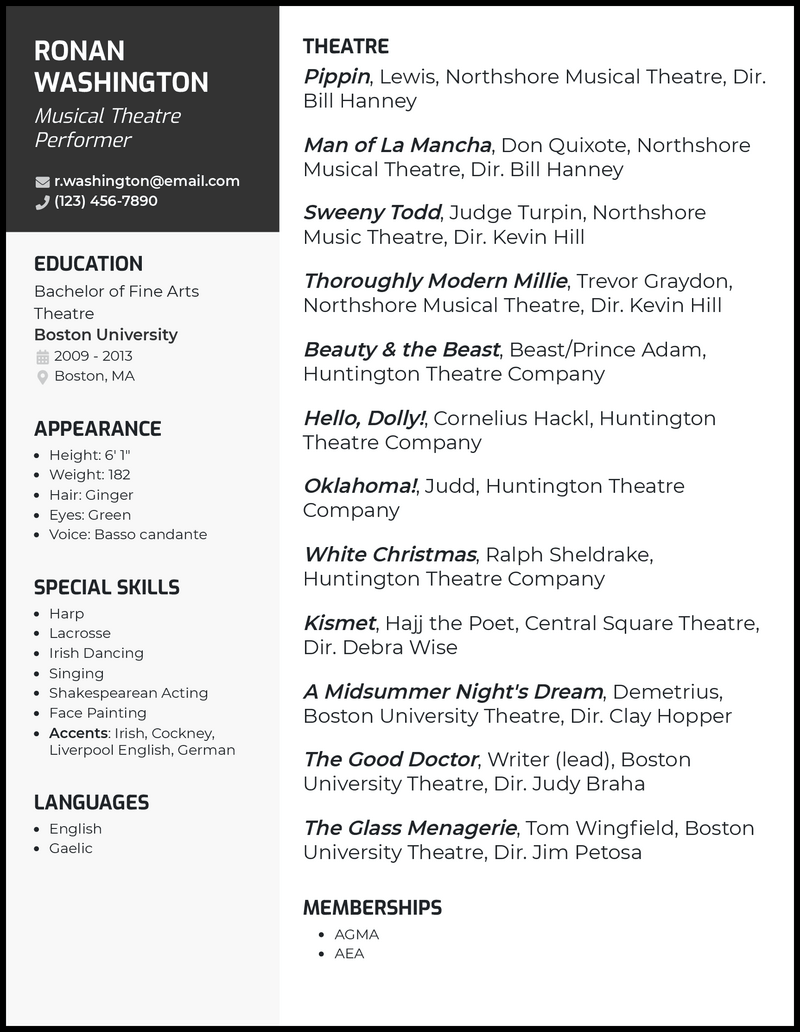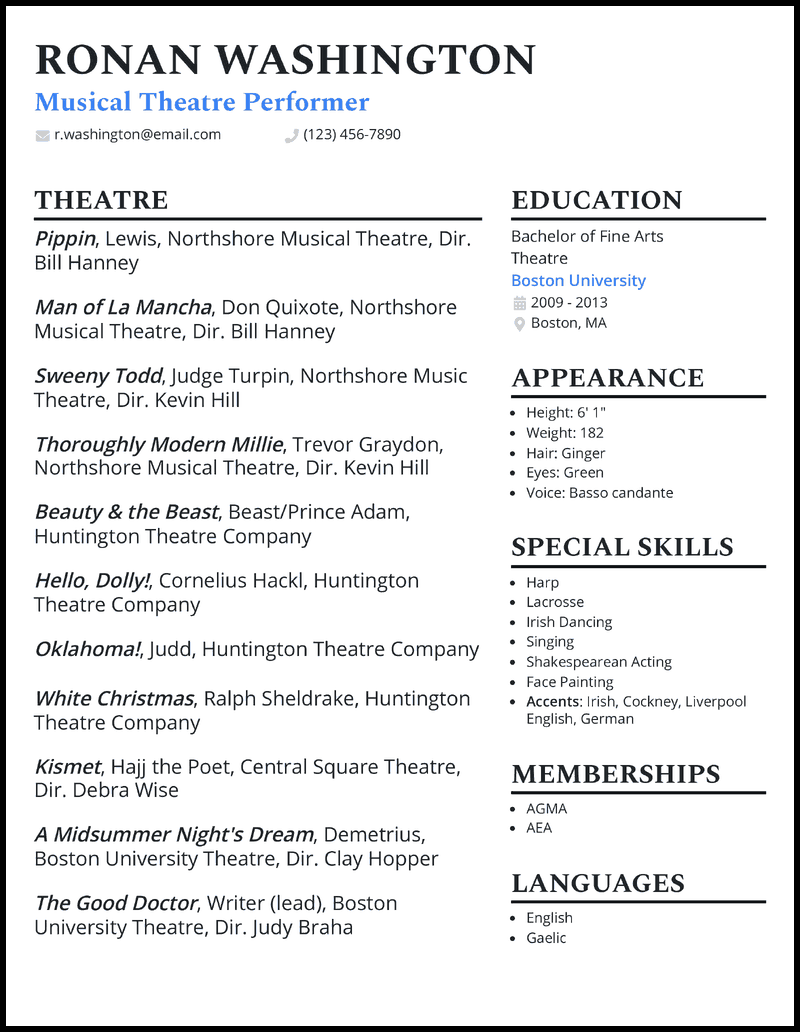You have an incredible ear for tone and timing, incredible style, and a vast array of tricks up your sleeve for how to perfect your role in each production. Dancing skills and gracefully expressive moments may also make their way into your repertoire, depending on your niche.
But how can you create a resume that looks as incredible as your performances sound? How will your resume differ from those of other professionals?
Never fear: We’ve helped plenty of people in the theatre! Our three musical theatre resume examples can help you build up an application that’s music to a recruiter’s ears.
Why this resume works
- For a dazzling musical theatre resume, it’s not just about the gigs you’ve had. Let your skills do the heavy lifting, too, and that way, you nudge the casting director to dial your number for your next big role.
- Ronan has this neat section in the side column showcasing his special proficiencies like harp, lacrosse, singing, face painting, and accents. Why not top off yours with a list of your professional affiliations (cue AGMA and AEA) and physical attributes (think height, weight, eyes, hair color, and vocal range)? In essence, you want to be the versatile performer the potential employer desires for their team.
Related resume examples
What Matters Most: Your Skills & Theatre Experience Sections

Your skills section is going to look a little different on a musical theatre resume if you’re a performer! Since there’s such an emphasis on casting in musical theatre, you’ll want to have a section for your physical traits, like stature, weight, and hair/eye color.
You’ll also want to include highly profession-specific details like the pitch of your singing voice and which languages you sing in. And don’t forget to mention skills like acting accents, dance styles, and any instruments you play.
Make sure you’re specific about that stuff, too: Don’t just say “musical instruments,” say “flute” or “classical piano”!
9 best musical theatre skills
- Harp
- Opera Singing
- Shakespearean Acting
- Modern Dance
- Face Painting
- Irish Dancing
- Classical Piano
- Costuming
- Gymnastics
Sample musical theatre work experience bullet points
Your resume’s about to look super sleek because your qualifications probably won’t involve bulleted lists that describe your accomplishments. You’re a performer, at heart and on stage, so that’s what belongs under your experience section: Performances!
Be specific about which productions you performed in (and which role!), and also specify the venue and director. Recruiters want to know the exact details here, and your performance history is often your biggest set of qualifications (although it’s balanced well with a hefty skill set if you haven’t performed much just yet!).
The roles, shows, venues, and directors you performed with are the strongest metrics for your success and qualifications. If you performed that piece, you did it!
Here are some samples:
- Man of La Mancha, Don Quixote, Northshore Musical Theatre, Dir. Bill Hanney
- Beauty & the Beast, Beast Prince/Adam, Huntington Theatre Company
- The Glass Menagerie, Tom Wingfield, Boston University Theatre, Dir. Jim Petosa
- Sweeny Todd, Judge Turpin, Northshore Music Theatre, Dir. Kevin Hill
- A Midsummer Night’s Dream, Demetrius, Boston Univeristy Theatre, Dir. Clay Hopper
Top 5 Tips for Your Musical Theatre Resume
- Showcase your versatility
- Include a variety of stylistically different performances in your work experience section to show your ability to adapt to different roles. Your ability to deliver a smashing performance in various genres is a great attention-grabber!
- Mention your memberships
- If you have any notable memberships like an Actors’ Equity Association (AEA), make sure you include those alongside other qualifications like the Theatre specialization in your Bachelor of Fine Arts!
- Think about a cover letter
- Your memorable experiences in musical theatre give you an excellent opportunity to set off your resume with a compelling cover letter. Remember that time you saved the scene by improvising after a mishap? Stories like these that demonstrate your unique skills as a performer make excellent context for your performances/experience section!
- Keep colors minimal
- With how beautifully sleek your musical theatre resume layout looks, you might be tempted to spice things up with a bit of color: And that’s fine! Just make sure you stick with minimal use of an understated color to preserve a nice, professional look.
- Get critical about objectives and summaries
- Again: Your resume is a bit different than many others! You have several sections, like your appearance, bilingual skills, and memberships, that many other resumes don’t, so you probably don’t want to add another section for a summary or objective unless your list of performances is still short enough to need one.
Nope! While you should limit yourself to one page, you don’t need to worry about filling every bit of space. Play around with our resume template layouts and see which makes your experiences shine the brightest, and don’t be afraid of a little white space!
Research them . . . and re-read the job description! You can find countless hints in the original job ad that tell you what the culture is like. Look for key values like Broadway-level excellence or family-friendly performances that you can align yourself with in your examples.
You may have seen some people list their hobbies and interests on other resumes, so think of what kinds of non-professional skills you have that might bolster your ability in musical theatre. (Were you awesome in gymnastics or sports, boosting your lung capacity and your range of expression?)








